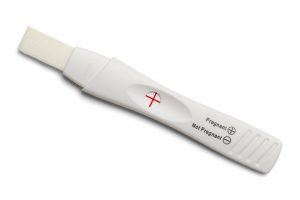You pee on a stick and a second line confirms that you are pregnant – congratulations! If you had prior pregnancy losses, or are undergoing fertility treatment such as in-vitro fertilization or intracytoplasmic sperm injection, you will usually be closely monitored by your obstetrician or reproductive endocrinologist. In the first few weeks, this usually involves testing of a hormone called human chorionic gonadotropin-beta, or hCG-beta for short. This is the same hormone that home pregnancy tests measure. However, your home pregnancy test is just a qualitative test and only tells you whether you are pregnant or not. The hCG-beta test that your doctor will order is quantitative, as it will measure the actual amount of hormone in your blood.
What exactly is hCG-beta and what does it do?
hCG-beta is a hormone produced by the rapidly dividing placental cells of your embryo. Its main function is to stimulate your corpus luteum, a structure created when your ovary releases an egg, to continue to produce estrogen and progesterone. These hormones are very important for maintaining the endometrial lining.
What are normal hCG-beta levels in pregnancy?
Levels of hCG-beta are detectable in blood tests at around 11 days after conception and around 12-14 days after conception in urine tests.
Typical levels are:
- 3 weeks (gestational age*): 5 – 50 mIU/mL
- 4 weeks: 5 – 426 mIU/mL
- 5 weeks: 18 – 7340 mIU/mL
- 6 weeks: 1,080 – 56,500 mIU/mL
- 7 – 8 weeks: 7,650 – 229,000 mIU/mL
- 9 – 12 weeks: 25,700 – 288,000 mIU/mL
- 13 – 16 weeks: 13,300 – 254,000 mIU/mL
- 17 – 24 weeks: 4,060 – 165,400 mIU/mL
- 25 – 40 weeks: 3,640 – 117,000 mIU/mL
As you can see, the levels can vary widely between women at any given time point. Although your doctor will be looking for a certain level when you do your first hCG-beta test, the second hCG-beta test will be more indicative of whether or not your pregnancy is viable. In general, hCG-beta numbers double every 2 to 3 days in around 85% of healthy pregnancies up to an hCG-beta level of around 1200 mIU/mL. After this point, the doubling time increases to 3 to 4 days and then over approximately 6000 mIU/mL, the doubling time will be over 96 hours.
If your hCG-beta is not doubling as it should in the first few weeks of pregnancy, it could mean several things. One possibility is that your pregnancy is ectopic – that is, outside of the uterus (e.g. a fallopian tube). One of the main characteristics of an ectopic pregnancy is a slow-to-rise hCG-beta (although not in all cases). Other possibilities are that it is a blighted ovum, where only the gestational sac develops but not the embryo, or an embryo with chromosomal abnormalities that isn’t able to develop properly. Another possibility is that you are one of the 15% of women for whom their pregnancies are normal but are just a little slow to get going. Hopefully, it is the latter!
On the other extreme end of the spectrum, if your hCG-beta numbers are sky-high, then this could mean that you have what is called a molar pregnancy. This type of pregnancy is caused by an error occurring during fertilization of the egg by the sperm. This results in the rapid growth of abnormal tissue that looks like clusters of random grape-like cells. Most molar pregnancies will be expelled spontaneously or else removed by suction, curettage, dilation and evacuation. Luckily, molar pregnancies are extremely rare. Another less insidious and much more common reason for high hCG-beta levels is a twin pregnancy, although the levels will not get as high as they would for a molar pregnancy. Additionally, if your baby is a girl, your hCG-beta levels will tend to be on the high side.
However, it is best not to obsess over your hCG-beta numbers (I know – it’s easier said than done) because an ultrasound at 5 or 6 weeks will have a much better power to predict whether or not your pregnancy is healthy.
*The gestational age is the age of your pregnancy when dated from your last menstrual period.

